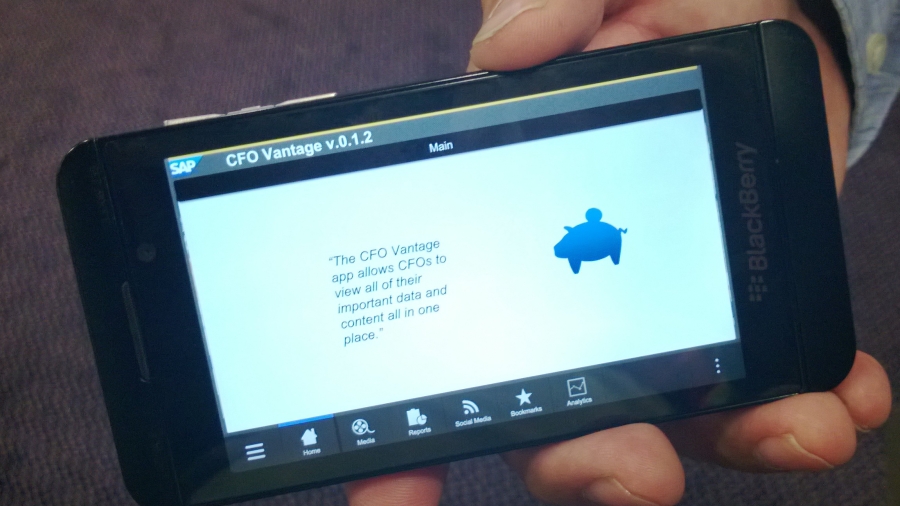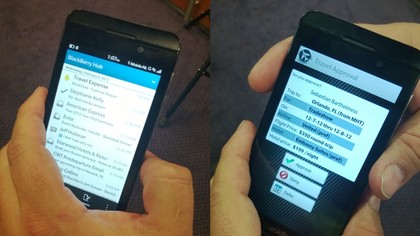Can BlackBerry 10 win over business buyers?
Beleagured company needs a boost from sales of its Z10 and Q10 smartphones

Sign up for breaking news, reviews, opinion, top tech deals, and more.
You are now subscribed
Your newsletter sign-up was successful
BlackBerry says its new Z10 smartphone, the first using its BB10 platform, is selling "close to three times our best in first week sales", and stores have reported that some businesses are buying up to 10 at a time.
It had a bad year before the launch, but its heritage is in the business market where it pioneered push email and long battery life. Is BB10 going to help BlackBerry reassert its top position in the business smartphone market?
The touchscreen BlackBerry Z10 is out now, and the BlackBerry Q10 with its physical keyboard and longer battery life (thanks to the larger battery and smaller screen using power-saving OLED technology), is due to arrive in April.
BlackBerry understands that individual users are increasingly making their own choices of business device, which means its new offerings will have to appeal to users who want a big screen, a powerful processor and excellent gaming support. But business functions will still be a crucial factor in whether BB10 proves a long term success.
Among the assets visible on the Z10 smartphone is the powerful predictive text on the touch keyboard (almost as good as Windows Phone 8 Word Flow in our tests), and the standards-compatible browser, which will be useful in dealing with email and intranet sites.
Larger businesses can use the HTML5-based WebWorks tools to build their own dashboards and scorecards for monitoring key information, using the web technologies with which they're increasingly familiar, or port an app already written in Adobe AIR. The browser in BB10 even comes with a Flash plug-in.
The advantages of BlackBerry Messenger are familiar: knowing when your message gets to someone and if they've read it is an asset when messages are part of an existing workflow or contribute to meeting service level agreements. That can be built into applications, for receipts and to send push notifications, so you're not relying on workers remembering to check a portal or log in to a website to see if there's something they need to know.
Sign up for breaking news, reviews, opinion, top tech deals, and more.

Often the information you want to push out to workers lives behind your firewall rather than out on the internet. That means deploying and supporting virtual private networks (VPNs) for iPhone or Android, and setting up DirectAccess or SharePoint for Windows Phone (which does not support VPN access).
But it can be more straightforward with BB10 if you have BES 10, the latest version of the BlackBerry management server. This enables you to get information from internal servers and applications and send it directly to apps on BlackBerry handsets without a VPN connection. Also, unlike many simple web apps, even BlackBerry WebWorks applications can cache the data and make it available when users are offline.
BES 10 connects to servers behind the firewall using standard http protocols, and you create the notifications to send to a BlackBerry using standard http post commands. But they're delivered over the encrypted (and compressed) connection from the BlackBerry cloud service to the phone, and go to an app that lives in a secure work partition that the company can manage.
You can manage any Android or Apple smartphone (with your choice of mobile device management tools, including BES 10) as long as the user doesn't mind that an administrator can see what apps they're running. You can also block any apps that the company decides are a problem, force users to tap in a complicated PIN even when they're just sending a message to a friend, and erase all their personal photos if the phone ever gets lost.
That could cause problems, as it would be widely acceptable on a work phone issued as part of the job, but less so when someone is using their own phone for work.
Other significant features include BlackBerry World for Work for managed handsets, through which a business can highlight apps from the main BlackBerry World or those it has written internally or licensed from an independent software vendor. This is similar to the company hubs that are found for Windows Phone 8 using Intune 4, as well as the various private Android app stores.
Also important is the BlackBerry Balance technology for separating work and personal information, using the secure architecture of the QNX system on which BB10 is built. Together they promise to give the Z10 and Q10 split personalities that could suit businesses and individual users.
One advantage is that apps, email, documents and screenshots for work can be stored in a separate, secure, managed area of the device that BlackBerry refers to as a perimeter. As BlackBerry's app platform manager Tim Neil explains it, nothing in the personal perimeter can be used with work information.
"If someone emails you a picture to your work account, you can't save it into BBM," he says. "You can't cut and paste from work email into your personal perimeter and you can't accidentally send a message form your work account to look like it's from your Gmail account."
Although an administrator can remove applications or wipe information stored in the work perimeter, they have no access to the personal section of the phone.
This could be important in ensuring that the new BlackBerry smartphones retain their appeal to individual users. In turn, that could make BB10 a great asset for business.
Mary (Twitter, Google+, website) started her career at Future Publishing, saw the AOL meltdown first hand the first time around when she ran the AOL UK computing channel, and she's been a freelance tech writer for over a decade. She's used every version of Windows and Office released, and every smartphone too, but she's still looking for the perfect tablet. Yes, she really does have USB earrings.